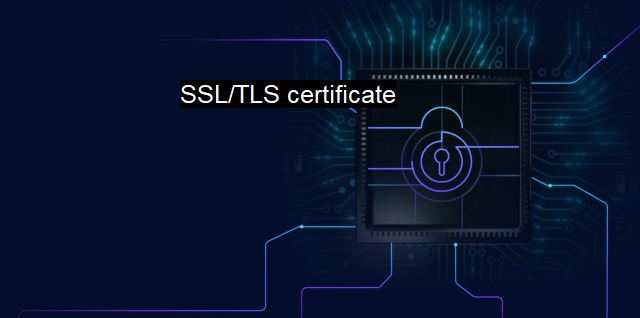What is SSL/TLS certificate?
Understand SSL/TLS Certificates: Protecting Your Online Communications and Activities
The SSL/TLS Certificate is an essential constituent in the domain of cybersecurity and antivirus. These certificates form an integral aspect of secure and safe online browsing, enhancing the integrity of web-based platforms, especially e-commerce sites and online banking interfaces where data protection is paramount. The term SSL stands for Secure Socket Layer, while TLS refers to Transport Layer Security. These protocols function to establish a secure communication session through the online network.An SSL/TLS certificate serves to verify the identity of a device or a server and facilitate the generation of an encrypted connection. It contains a plethora of information, such as the key to enabling encryption, the identity specifics like the domain name or the contact details, and details about the certificate's validity and the authority that issued it.
At a time when users frequently exchange data over the internet, including sensitive information such as banking details, the importance of SSL/TLS certificates simply cannot be overstated. The most significant benefit that these certificates offer is encryption. They enable the server to encode the data before it begins its transit, keeping the data unintelligible to unauthorized and illegitimate domains. This transforms the data into a secret code that can be deciphered only by a device that carries the corresponding decoded key.
SSL/TLS certificates indicate the credibility of a website. When a user enters a site, they are likely to trust it if it indicates that the site has an SSL/TLS certificate. This is portrayed by a padlock symbol found before the URL in the search bar of the browser and HTTPS showing up instead of HTTP. Consequently, users are more inclined to share their data, increasing the traffic and potential leads of these sites.
Mealymouthedness about the capacity of a platform to secure personal data is a blatant and constant cause of worry to several users. Here's where SSL/TLS certificates can aid encryption in a wider perspective of cybersecurity, emphasizing efficient antivirus practices. It helps build a secure shell around the data, making it tougher for viruses, trojans, and other malicious software to infiltrate, in detriment of data integrity and protection.
With cyber threats growing in complexity and sophistication, the role of SSL/TLS certificates in securing online activities has become ever more critical. Maintaining a pristine SSL/TLS certificate, with its encryption strength and potential to shield data from external threats, can significantly lessen the direct and indirect costs linked to unprotected data exposure.
The digital landscape currently is intricate and extensive with proliferating threats that may violently disrupt lives and businesses. For these reasons, cybersecurity measures, including the SSL/TLS certificates, should be a prominent priority.
Contrarily to lecture, one might argue that SSL/TLS certificates discourage potential threats and constitute a formidable defense. Still, while these certificates establish an encrypted connection, they can't protect a website from every form of overall cybercrime completely. Cybersecurity is a wide domain where other measures such as firewall installation, access control schemes, and regular updates are indispensable elements.
To summarize, an SSL/TLS certificate plays a significant role in cybersecurity and antivirus practices. It equips a website with a strong defense mechanism that provides data protection, credibility, and ultimately fosters the trust of users in online platforms. And while not foolproof, these certificates catalyze the core essence of cybersecurity measures- wherein facilitating secure digital browsing comes to the foreground.

SSL/TLS certificate FAQs
What is an SSL/TLS certificate?
An SSL/TLS certificate is a digital certificate that is used to secure communication over the internet. It provides a secure and authenticated connection between a website and its visitors by encrypting the data transmitted between them.Why is an SSL/TLS certificate important for cybersecurity?
An SSL/TLS certificate ensures that the data transmitted between a website and its visitor is encrypted and cannot be intercepted by a third party. This prevents data theft, tampering, and eavesdropping, thus enhancing the security of online transactions and communications.How does an SSL/TLS certificate protect against antivirus threats?
An SSL/TLS certificate helps protect against antivirus threats by establishing a secure connection between a website and its visitors. This makes it difficult for malware to intercept the traffic and steal sensitive information or plant viruses on a user's device. Additionally, some antivirus software may also be able to scan the encrypted traffic for potential threats.Do all websites need an SSL/TLS certificate?
Yes, all websites need an SSL/TLS certificate as it is vital for online security. In fact, some web browsers like Google Chrome and Mozilla Firefox now require websites to have an SSL/TLS certificate to be considered secure. Without an SSL/TLS certificate, data transmitted between a website and its visitors is vulnerable to theft, tampering, and eavesdropping.| | A | | | B | | | C | | | D | | | E | | | F | | | G | | | H | | | I | | | J | | | K | | | L | | | M | |
| | N | | | O | | | P | | | Q | | | R | | | S | | | T | | | U | | | V | | | W | | | X | | | Y | | | Z | |
| | 1 | | | 2 | | | 3 | | | 4 | | | 7 | | | 8 | | |||||||